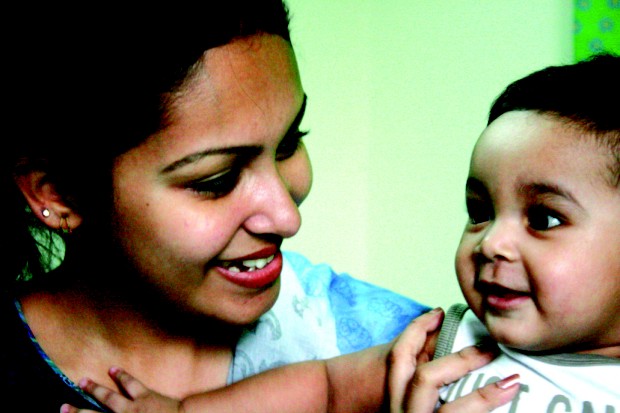| Home - Back Issues - The Team - Contact Us |
 |
| Volume 10 |Issue 26 | July 08, 2011 | |
|
|
Cover Story Parenting The Positive Way Raising a child is not easy. It is probably the hardest job in the world. It is so difficult that almost every day, there comes an inevitable moment when parents want to rip their hair out and scream at the top of their lungs, from the highest rooftops “I HAVE HAD ENOUGH!” Although you may never admit this to anyone, or yourself for that matter, if you're a parent, you can secretly relate. ANIKA HOSSAIN
As a parent, you will get plenty of advice on what to do, how to 'control' your children, how to discipline them, how to make them listen to you etc. Most of this advice will come from your own parents or elderly family members. While asking for help and information is always good, you must keep one thing in mind – times have changed. Things are definitely different from the way they used to be when you were children. Children nowadays are exposed to many things that were alien to you while you were growing up. You must keep in mind that your parenting techniques must keep up with these changes in order to be effective. Modern parenting methods may involve doing away with physical punishments, controlling every aspect of your child's life including picking out all their outfits and deciding who their friends should be. However, this does not mean you have to compromise on the values and morals you have learned from your own parents. Effective parenting can help you to have a healthy relationship with your child while at the same time instilling in them those values you have cherished and want to pass on to the future generations.
In this day and age, there are ample sources of information on parenting. There are books, websites and of course child development experts you can talk to. Recently, the SAARC Women's Association organised a seminar on “Positive Parenting,” where experts spoke about new and effective parenting techniques, which have proved to be extremely successful as research has shown. Child and Adolescent psychiatrist, Dr Shamim Matin Chowdhury, who was a spokesperson at this seminar describes parenting as, “A process of promoting and supporting the physical, emotional, social and intellectual development of a child from infancy to adulthood.”
Parenting is an ever-evolving process-- it is different for every child and it is not without its flaws. People, who try to tell you that parents cannot make mistakes, do not know what they are talking about. According to Chowdhury, at some point or the other most parents have: overlooked their child's bad behaviour hoping that he or she will “grow out of it”, made it a policy not to discuss drugs or alcohol problems in the family, made excuses to school authorities to get their child out of trouble, done chores their children were responsible for, thought they had failed as parents because their child was in serious trouble and disagreed with their spouse on how to raise their children. “Parents often do this for three main reasons,” says Chowdhury, “To keep their children from being unhappy, to give their children the benefit of doubt and to keep peace in the family. Despite their good intentions however, this has done exactly the opposite- we call this sort of behaviour enabling.” Chowdhury says, enabling is a process whereby well meaning parents unwillingly allow and even encourage irresponsible and self-destructive behaviour in their children by shielding them from the consequences of their actions. Luna Islam (not her real name), a mother of a 12-year-old says, “When my daughter was in class 3 and 4, she would refuse to do her homework sometimes. I would shout at her, and even slapped her a few times, but she would only throw tantrums and insist on watching TV. So I gave up and wrote notes to her teachers saying she was sick and could not complete her work. I felt terrible about it afterwards, but I didn't want her punished in school.” This is a prime example of enabling. There were several things that could have been done differently in this situation. When a parent is enabling a child, there are usually protective instincts, feelings of self doubt (whether they are handling the situation the right way), fear of alienating their children and anger (as a result of the child's tantrums and threats), which come to play. There are also mistaken beliefs involved which triggers this kind of behaviour, such as “There is nothing I can do, I am the last person my children listen to” and “If everybody else is doing it, it must be okay.” Giving in to your children to avoid conflicts, helping them keep secrets which should be revealed to your spouse or others concerned (catching them with beer on school property) and shielding them from consequences will only harm your child in the long run.
Every parent wants their child to grow up with certain qualities. They want them to be polite, respectful, attentive, caring and responsible. It doesn't take much to achieve this if you follow certain basic techniques on how to deal with your child. The first thing you must remember is that it is not unusual for a child to misbehave, have tantrums, fights, disobey you, break, spill, throw things, refuse to concentrate etc. Nine out of 10 times, however, they do this to get your attention. A child usually acts up because they are upset about something they cannot communicate with you. It may be because of something that happened in school, or because they are jealous of their siblings, or simply because they want you to spend time with them. In these situations, the best thing to do is to make sure you talk to your child and listen to what they tell you. Children will always try to test their boundaries by crossing lines. By conversing openly with them, you can tell them exactly what you expect from them, in terms of behaviour at home and outside, schoolwork, chores etc so there is no confusion. Often, when you shout at children, they may remain confused about what they have done wrong and be resentful toward you. Avoid using abusive language, which humiliates them. Instead, explain to them what you want them to do and have a discussion about it.
Sometimes, you have to help your child find the right words to describe how they are feeling. It is best to be patient even if this takes time. Whenever you refuse your child something, be it a new toy, or permission to sleepover at a friend's place, try to explain to them why you are saying no, instead of telling them to listen to you without question. This will create mutual respect and understanding between you. As your child grows up and the rules start to change, have a discussion with them about new rules and come to a compromise. For example, if you have set a curfew of 9pm for your teenager and s/he wants to stay out till 10pm, settle for 9:30pm and you're both happy. You must make yourself clear though, tell them they must be home by 9:30 not set off from wherever they are at that time. When you set rules for your children, you must make sure you are modelling these behaviours yourself. Children are more likely to learn from your behaviours than follow instructions. For example, if you have asked them not to put their feet up on the coffee table, don't do it yourself because this will only confuse them. “You must always spend time with and engage in activities with your children,” says Chowdhury “Make sure you set aside family time, specially during mealtimes, when the entire family can interact and talk about their day.” “I wanted to teach my six-year-old daughter how to share and think about others,” says Shahnaz Tanveer, “My husband and I gave her a piggy bank where she kept money she received on her birthday and Eid, hoping this would teach her how to save. Once it is full, I ask her to use the money to get simple inexpensive gifts for her grandparents or someone she loves before buying something for herself. I taught her the concept of being unselfish and sharing through this activity.” As your children grow up, they will try to establish themselves as individuals and want more independence. You must encourage this by allowing them to do things for themselves such as pick out their own clothes, study alone, choose how to decorate their rooms etc, but at the same time, make sure they do not cross your boundaries. As your children grow older and are more aware of their surroundings, they will have questions about sex, drugs, alcohol etc. However uncomfortable this may make you, you must create an environment of trust and acceptance, so they are comfortable enough to bring these topics up with you. Talk openly and candidly about these subjects so that your children don't go to other unreliable sources for information. According to Chowdhury, as parents, you must allow your children to make mistakes. Don't fly into a rage and terrorise them to a degree that they feel they cannot come to you when they are in trouble. It is important for your children to trust you enough to know that you will help them no matter what.
This does not mean that their actions will not have consequences. As mentioned before, physical punishment is not an appropriate solution to the problem. Conseque-nces must be such that they discourage the child from repeating what they have done wrong and something you and your spouse agree on before you speak to your child. Withdrawing certain privileges is one way to go, for example, if your teenager loves talking on the phone or using the internet, you can take away those privileges for a week. “Make sure you are consistent with the consequences you set,” says Chowdhury “And that they are reasonable, timely and not too elaborate in order to avoid confusion. If the behaviour pattern continues, the consequences should escalate in severity and force.” You must make sure you are calm and authoritative when you are issuing these consequences, for them to be taken seriously. “One thing to keep in mind is, when confronting their negative behaviour, make it clear that you are focusing on their behaviours and not thinking of the child as a bad person,” says Chowdhury. Chowdhury says, when setting consequences you must avoid settling for punishments that amount to revenge, leaving the child angry and embarrassed. This is easy to do when you are overcome with anger yourself. You must also avoid drastic consequences such as sending them away from home etc unless it is absolutely necessary. Shaming and disrespecting them and name-calling is also inappropriate and ineffective. It is useful for parents to take a step back, calm down and discuss appropriate consequences with each other. It is also important for parents to recognise when the child is usually acting up and minimise the triggers. This involves closely observing and interacting with the child so the parent is aware when something is wrong and behave in a way, which will calm the child down and distract them before they have a tantrum. “When I was twelve or thirteen, my mother caught me trying to smoke a cigarette and handed me over to my father who struck me with his leather belt, which was the usual punishment for all our childhood crimes,” says Imtiaz Hossain who is now in his thirties, “I remember the pain from the experience, but I didn't really think I was doing anything wrong so I didn't stop smoking. I would just make sure I was never caught. Looking back, I understand why they were angry but I wish they had explained it to me back then.
ou must always show your children and tell them how much you love them,” says Dr Naila Zaman Khan, Professor and Head of the Department of Pediatrics and Neuroscience at the Dhaka Shishu Hospital, who also spoke at the seminar for positive parenting. According to Zaman, physical affection such as hugs and kisses and verbal reassurance of that love will give your child a sense of safety and security. This secure base will then allow them to explore other relationships and situations confidently. Zaman also mentions that parents must be consistent with their attention for their child. “There are parents who at times will be very attentive and show interest in the child, while at other times be preoccupied and dismissive,” says Zaman. This confuses the child and creates insecurities. Parents must be consistent with their love and affection, even when the child is being difficult and abusive. When raising a child, there is the larger system to deal with. Children learn from their teachers, their neighbours, friends and extended families. Too many subsystems may confuse a child, therefore it is important for parents to communicate with their children about the education they are receiving outside their homes and reinforce their teachings.
“One very effective way parents can encourage desirable behaviour is by praising the child whenever they have done something positive and giving them plenty of attention,” says Zaman, “Parents can also practice incidental teaching, for example if they notice someone doing something positive, such as helping an elderly person cross the street, they can point it out to their child and praise the behaviour.” This is a very effective way to teach new skills and behaviours. Research has shown that among the children in Bangladesh who are brought to professionals for counseling suffer from the highest number of hyperkinetic disorders which involves symptoms of attention deficit disorder (ADD), destructive, restless behaviour. The second highest suffer from pervasive development disorder such as autism and delayed development. A significant number suffer from conduct disorder (they take pleasure from hurting others), mood disorders (such as bipolar disorder), somatoform disorder (attributing emotional problems to organic problems) etc. According to Zaman, research has also shown that an increasing number of pre-arranged visits to professionals help improve the child's condition. Interestingly, the research results are paradoxical, because they also show that these increasing number of visits increases the stress levels of the mothers of these children. This usually happens because of many reasons. The mothers often face difficulty bringing the child to therapy because it is expensive. In our society there are also many family restrictions involved when one seeks psychiatric help. The social stigma also has a large role to play in increasing the mother's stress and affecting her health. Research has also shown that parents who want to receive information on child related issues and parenting skills prefer to get this information through television programmes, the internet, work books, written material, parenting groups, resource centres and home visits from therapists. According to Zaman, poor parenting is strongly linked with behaviour at problems in children seeking services in Bangladesh.
While there are some Multidisciplinary Child Development Centers available, there must be centres set up medical colleges all over the country. These must include Mental Health and Psychological Counseling Services. Any intervention programme to optimise children's development must include strategies for Positive Parenting, otherwise, they increase family stress. Evidence-based research to evaluate Parenting Programs are currently unavailable in this country and they are needed urgently. Also, parenting programmes via media dissemination needs proper development, for the wider community. “One thing that parents must remember is that they have to be healthy themselves to be good parents,” says Zaman. Parents must remember to take time to look after themselves. They should have interests outside their home, engage in activities with friends, take an occasional trip somewhere leaving their kids in safe hands. Often, play dates can be useful so that children can interact with others their age and parents can socialise among themselves.
Parenting is a process. It may be difficult at times when things are going well it brings ten times as much joy and pleasure to a parent's life. The key things to remember when things get rough is to stay calm, remove yourself from a stressful situation and give yourself time to think, explain to your child clearly what went wrong, think about what you can do differently in these situations. Ask for advice and assistance when you need it. Always give lots of praise and show your affection for your child. Chaos is a part of life, but systematic chaos is sometimes needed to make life interesting. At the end of the day what is important is that you love your children and want the very best for them. The results of a 100 trials show that Positive Parenting has reduced many psychological problems in children. That should be reason enough to give it a shot. Copyright
(R) thedailystar.net 2011 |
||||||||||||||||||||||||












